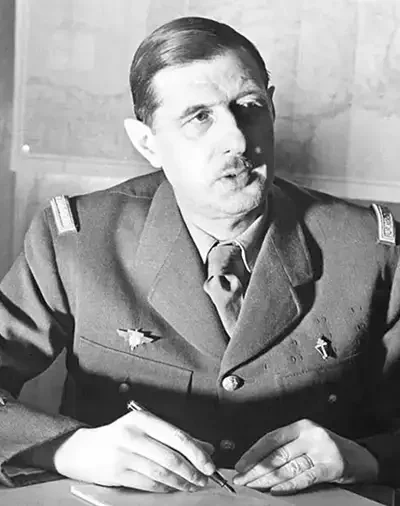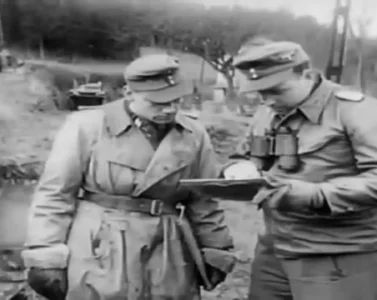- Military History
- Biographies
- Militarians Biographies
- Charles (André Joseph Marie) de Gaulle
Charles (André Joseph Marie) de Gaulle
De Gaulle was the military and political leader of the Free French forces and government-in-exile during World War II
The son of an intensely nationalistic family, Charles de Gaulle, was educated at the Military Academy of Saint-Cyr and joined an infantry regiment (under Col. Philippe Petain) as a second lieutenant in 1913. He impressed Petain and others with his intelligence, initiative and once World War I erupted, with his courage as well. He fought at the do-or-die defense of Verdun, was wounded in combat three times and was a P.O.W. for two years and eight months. During his captivity, he made five valiant, although unsuccessful attempts to escape.
Following the war, de Gaulle served briefly as a member of a military mission to Poland, then taught at Saint-Cyr. He was chosen for two years of special training in strategy and tactics at the "Ecole Superieur de Guerre" (the French War College).
When he graduated from the course in 1925, Marshal Petain promoted him to the Staff of the "Conseil Superieur de la Guerre" - the Supreme War Council.
Major De Gaulle served during 1927-29 in the army occupying the Rhineland. During this period, he became alarmed by the continued danger he saw posed by German aggression. After his Rhineland assignment, he served for two years in the Middle East. Then, as a lieutenant colonel, he served for four years as a member of the secretariat of the "Conseil Superieur de la Defense Nationale" - the National Defense Council.
Besides his work as a field and staff officer, de Gaulle was a powerful military theorist who, in 1924, wrote a study of the relation of the civil and military powers in Germany: “Discord Among the Enemy”. He also lectured about leadership (the lectures were published in 1932 as “The Edge of the Sword”). Two years later, he published a study of military theory “The Army of the Future”. In this work, he developed and defended the idea of a small professional army that was based on high mechanization for maximum flexibility and mobility.
This directly opposed the static defense strategy represented most dramatically with the Maginot Line. Not gratified to allow his ideas to be taken as merely academic, he appealed to political leaders to persuade them to his point of view. The result was disharmony with de Gaulle's commanders and senior officers, including Marshal Petain himself, who protested de Gaulle's right to publish a historical study titled “France and Her Army” (The work appeared in 1938).
With the outbreak of World War II, de Gaulle was put in command of a tank brigade of the French Fifth Army. He was quickly promoted to the temporary rank of brigadier general in the Fourth Armored Division (this was the highest military rank he was to hold) and proved himself a very able tank commander. He was named undersecretary of state for defense and war on June the 6th of 1940 by French premier Paul Reynaud, who sent him on several missions to England to explore ways in which France might continue the war against Germany.
De Gaulle remained in England when the Reynaud government fell and was replaced by the collaborationist government of Marshal Petain (Vichy France), who immediately set about seeking an armistice with Germany. On June 18, 1940, de Gaulle broadcast from London his first appeal to those French people who would resist Germany to continue under his leadership the war against the Nazis. Because of this and repeated broadcasts, a French military court tried de Gaulle in absentia, found him guilty of treason, and sentenced him to death, loss of military rank and confiscation of all property (August 2, 1940).
De Gaulle threw himself with great skill, energy and determination into organizing the Free French Forces and a Free French shadow government. It was an extraordinary task, for he was all but unknown outside of French military circles. Even the people of France did not recognize him as a political figure. All that sustained him was his self-confidence, his strength of character, and his ability to lead. Throughout the war, until the liberation of France, de Gaulle continued to broadcast from London (until he moved his headquarters to Algiers in 1943) and to direct the action of the Free French Forces and other resistance groups ("the underground") in France. He worked closely (though not always smoothly) with the British secret services in this effort.
Because his relations with the British government and military were often difficult, de Gaulle moved his headquarters to Algiers in 1943. There he became president of the French Committee of National Liberation. He served at first with General Henri Giraud, but skillfully engineered his removal and emerged as a sole leader of the committee. It was de Gaulle at the head of the government-in-exile who returned to Paris on September 9, 1944 after its liberation.
De Gaulle led two successive provisional governments, but on the 20th of January 1946, he resigned over a dispute with the political parties forming the coalition government. He opposed the Fourth French Republic as too likely to repeat the errors of the Third Republic and in 1947 formed the Rally of the French People (Rassemblement du Peuple Francais = RPF) which won 120 seats in the National Assembly in the 1951 elections.
Becoming dissatisfied with the RPF, he severed his connection with it in 1953 and it disbanded in 1955. De Gaulle retired for a time (during 1955-56) and wrote three volumes of memoirs.
When insurrection broke out in Algiers in 1958 and threatened to bring civil war to France, de Gaulle was brought back to the national limelight as prime minister designate, and on December 21, 1958 was elected president of the Republic. He served for the next ten years amid much turbulence, controversy and opposition from the nation's left-wing political leaders. After his retirement, he continued writing his memoirs but died of a heart attack the year after he left office on the 9th of November in 1970.
Charles (André Joseph Marie) de Gaulle - Quick Facts
- Free France (1940-1944)
- France
- 4th Armored Division (France - 1940)
- Free French Forces
- French Armed Forces
- French Army
- WWI (1914-1918)
- WWII (1939-1945)
- First Indochina War (1946-1954)
- Cold War (1947-1991)
- {{#owner}}
- {{#url}} {{#avatarSrc}}
{{name}} {{/url}} {{^url}} {{#avatar}} {{& avatar}} {{/avatar}} {{name}} {{/url}} - {{/owner}} {{#created}}
- {{created}} {{/created}}
























